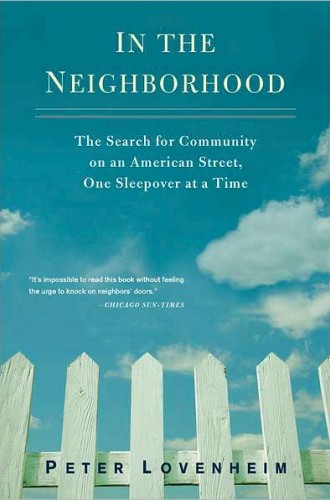Suburban search for meaning

In my suburban neighborhood, we rarely see our neighbors during the winter. We pull our cars straight into the garage, which in some cases leads us straight into the house without ever having to feel the cold or see the sky. Rushing back and forth to work, to school, to the grocery store and to the countless appointments of our overscheduled children, it is possible to forget whether you know anybody you have not made an appointment to see. That is my excuse for the winter months. So how do I account for the spring?
Last fall, our neighbors directly across the street moved and sold their house to a family who are members and regular attenders of the church I have served for the past seven years. I see them on Sundays, but it took me three months to figure out that they had moved into the house across the street.
Read our latest issue or browse back issues.
During those months, I would see Tracy running or walking her dog and I would think, "It's interesting that her route takes her to my block these days." I saw her enter the house across the street in her running clothes and acting with the confidence of someone who lived there ("Gosh, does she know the new neighbors? I should ask her about them since I've not yet met them"). And one day I saw her emerging from the house with her dog ("Why is Tracy's dog inside my neighbor's house?"). Finally it dawned on me.
In theory, I consider myself to be a person who values and appreciates community. As a pastor I do all I can to foster community in my church. But in practice, I have not been a very good neighbor.
Peter Lovenheim was forced to wrestle with this problem after a disaster struck in his posh suburb of New York. A mother of two was shot and killed by her husband, who then shot himself, leaving their two children to run out into the streets in the dark, screaming for help at a neighbor's door. An elderly couple took the children in and later hosted family members for the funerals and the aftermath. In the wake of that event, Lovenheim realized that he knew almost nothing about the lives of his neighbors.
He decided to learn more about the family that had seemed so happy but clearly was not. The parents were two successful doctors who worked out together at the gym, played tennis and seemed to balance family life and work easily. But in visiting with the mother's family and friends, Lovenheim uncovered a different story. The husband had been mentally unbalanced and raging for a while. The marriage was ending. On the night the man shot his wife, she had spent the whole day and evening repeatedly calling her best friend, who lived 20 minutes away, leaving numerous messages to ask if she and the kids could come over because she was uneasy about her husband's state of mind. But the friend was not reachable, and the mother made the fateful decision to go home anyway.
After her murder, the woman's friend felt guilt-ridden for not having been available to her best friend, though it was through no fault of her own. Lovenheim became tortured with the thought that haunted the murdered woman's best friend and her family: Why did she go home that night? And could it have been different?
But Lovenheim had another question. Why hadn't the woman gone to her neighbors? Why hadn't she knocked on the door of a nearby neighbor—or anyone's door—and said, "I don't feel safe"? Why had she called one friend over and over again, but not called on the help closest at hand, a neighbor?
The answer, he decided, had to do with the isolation of his affluent neighborhood. Living in their large houses on big lots, on the fanciest and most prestigious street in the area, the residents had all bought into the American dream, but with it they had bought into isolation. The children set up play dates rather than gathering in the street, and they learned their behavior from the adults, who met friends at the tennis club, not on the sidewalk.
In this New York suburb, people talked late into the night on their cell phones with best friends who lived miles away, while on their own street they knew very little about one another--certainly not enough to ask for help at a vulnerable time. The murdered woman had probably thought that to knock on a neighbor's door would be embarrassing, would be making a big to-do of nothing. Perhaps she thought that once behind her own closed doors in a large and lovely house, she and her husband could endure one more night of pretending that everything was fine.
From that grisly incident came a good book for anybody who can't name their neighbors and a book that's even better for those who can and do appreciate them. Deciding to get to know his neighbors, Lovenheim embarked on a project to meet them one by one. He asked his neighbors to do something that is in some ways natural and in some ways totally unnatural in the suburban world: he asked his neighbors if he could spend the night.
The book he wrote based on this experience is a poignant and often hilarious description of what he discovered behind his neighbors' doors—from a real estate agent considering leaving her husband to a brave single mother with terminal cancer to a lonely retired doctor who later becomes that single mother's caregiver and driver. Lovenheim not only got to know his neighbors, but he lets us know them too—which in turn makes us want to know our own neighbors.
The book poses a profoundly theological question: Could we, in the busyness of our lives, be missing out on the very people that God intends for us to meet? Throughout scripture we are told to love our neighbor. We are not told to love our friends and family; that is assumed. We're told to do something harder—love our neighbors.
Not surprisingly, more than a few people turned down Lovenheim's request to spend the night. Imagine the response on your street if a neighbor you hardly knew approached people with such a proposition. But enough people said yes to Lovenheim to change the fabric of the neighborhood and to lead him to write this remarkable book. It would be trite to say that neighbors became friends, although that did happen in some cases. But by the end of the sleepover project, neighbors did become neighbors in the theological sense of the word—people who could nurse one another through loss of love and even loss of life by practicing real hospitality. Many were able to knock on one another's doors in a time of trouble and tell the truth about their messy lives.
Lovenheim refers periodically to his synagogue and the meaning that worship brings to his life. It comes as no surprise that a practicing Jew wrote this challenging and wise book, which centers on the desire to practice and to receive hospitality, a major theme of Judaism. He is clearly motivated by concerns greater than the social pressures of belonging, and greater even than the loneliness he felt during the unraveling of his own marriage and his divorce. When he describes his passion for hospitality, he sounds like a man with a calling.
Another suburban dad on a spiritual quest has also written a book that hits close to home—it's about the suburb in which I live, Glen Ellyn, Illinois. Tom Montgomery Fate's charming volume is about his search for meaning in the suburbs, a search that takes him to the woods of Michigan where he builds his own cabin.
A writer, professor of English at the College of DuPage and commentator for NPR, Montgomery Fate decided to live half his life in Glen Ellyn and half as a writer in the woods, going back and forth between two very different worlds. That journey takes him into a deep reading of Henry David Thoreau's Walden; or, Life in the Woods, which begins with these words from July 4, 1845, Thoreau's own personal Independence Day:
When I wrote the following pages, or rather the bulk of them, I lived alone, in the woods, a mile from any neighbor, in a house which I had built myself, on the shore of Walden Pond, in Concord, Massachusetts, and earned my living by the labor of my hands only. I lived there two years and two months. At present I am a sojourner in civilized life again.
Thoreau once said, "I went to the woods to live deliberately." Montgomery Fate playfully turns that statement upside down by saying, "I got married and had children because I wanted to live deliberately."
What makes Cabin Fever such good reading is that the author doesn't try to be a modern-day Thoreau. He acknowledges at the outset that his life is different from the transcendentalist's. Unlike Thoreau, Montgomery Fate has a family, a job, bills to pay and a house in the suburbs. But he still wonders about the deep questions of life, like whether he should get a BlackBerry device to stay in better touch with the office or whether he should resist the pull of technology that can distract us as much as it helps us. What leads to more understanding and community, and what communication actually leads to less? Here's Montgomery Fate on being tempted to get a BlackBerry:
My problem is that I both fear and need one. I need one to help get organized and caught up. Like most people, my life sometimes slips into sprawl mode—unchecked growth in too many directions: work, marriage, three kids in three schools, committees, church, friends, neighbors, and on and on. I don't handle this well. The e-mails and texts telling me where to be and what to do and how to vote sometimes pile up into a mountain of information I don't know how to climb. I'm not sure why. Maybe because nowhere in all those thousands of words is the gentle anchor of the human voice.
He ponders the hard questions of parenting, of loving a wife through a health scare, of saying goodbye to the family's 21-year-old cat. Like Lovenheim, he talks honestly about the strain of living in a fast-paced suburb where people not only tend to ignore their human neighbors but don't really pay attention to the birds, the trees, the bugs and the stars. It's the quest to know creation more deeply that takes Montgomery Fate and his family to a communal farm in Michigan where eventually he builds himself a cabin and comes to spend time there in solitude and writing.
Had Montgomery Fate simply abandoned his family and moved to the cabin to ponder the meaning of life, I would have hated this book. But the family is part of the cabin life too, part of the work of repairing walls and exploring paths—or being longed for when they are absent.
And had the author devoted the whole book to the time at the cabin, I would have liked it less than I do. Then the book would be in the same category as Thoreau's Walden, an interesting fantasy but one utterly unavailable to me and at some level unappealing because of the author's isolation. My own family means far too much to me to make me want to live in a cabin in a woods, although like others I do have days when I can see the attraction in such a life.
The magic of Cabin Fever is the author's willingness to move back and forth between the two worlds of hectic suburbs and the more isolated nature-soaked cabin. In one chapter we are with him as he repairs the cabin steps, and in the next scene we are with him as he tries to trim a tree in his own backyard. Both projects are well beyond his skill level, but the Thoreau in him wants to try. But unlike Thoreau's book, Montgomery Fate's includes a conversation with his wife, who makes him promise to stay away from chain saws and power lines (and includes his own admission that, like so many do-it-yourselfer husbands, he probably won't keep that promise).
The lure of the wilderness is far more interesting when contrasted to the lure of family life. By exploring the beauty of the countryside in Michigan, the author teaches us to see the beauty of the backyard bird feeder and the trees around the power lines.
Still pondering that BlackBerry purchase, Montgomery Fate writes:
As the technology gets smarter and faster, I get dumber and slower, and more distracted. This became clear to me last week when I again lost my car in the college parking lot. After a ten-minute search in the rain on the acre of blacktop, I finally found it. I pretended that I knew where I was going, but it was embarrassing. And last month, I found my billfold in the cheese drawer of the refrigerator after I finally decided to stop looking for it and finish making my lunch. And more than once I've been surprised at a stop sign, when a ceramic mug of hot coffee comes flying off the roof of my car, bounces off the hood, and shatters on the street. Perhaps these are all signs of something ominous, or of something increasingly common: living between the past and the future, but never quite in the present.
By digging deeply into the ordinary moments of life, he teaches all of us how to pay better attention.
What I hear from both of these writers is exactly what I have been longing to hear in these months of news stories about famous men—Arnold Schwarzenegger and Anthony Weiner, among others—behaving badly. It is the sound of men thinking deeply. Their dense musings are the opposite of the Facebook post or the tweet. These are books you want to spend some time with. Both authors paint a picture of the suburban dad that goes far beyond the stereotype of the golf-playing, beer-drinking, polo shirt-wearing, sports-loving, hail-fellow-well-met. There is much more going on under the facades of male success in the suburbs, and these two men give those struggles dignity. There is more to life than landing the big house, or the right car, or having a family that appears perfect. Our relationships matter. Our churches and synagogues matter. Our ability to live in the present matters. The Holy Spirit is among us, even in the most ordinary places. You just can't tweet that stuff, thank God.









